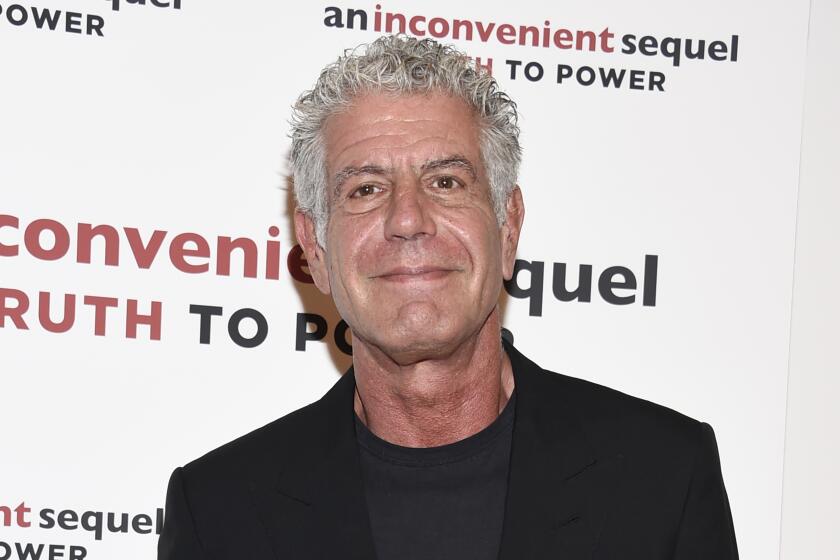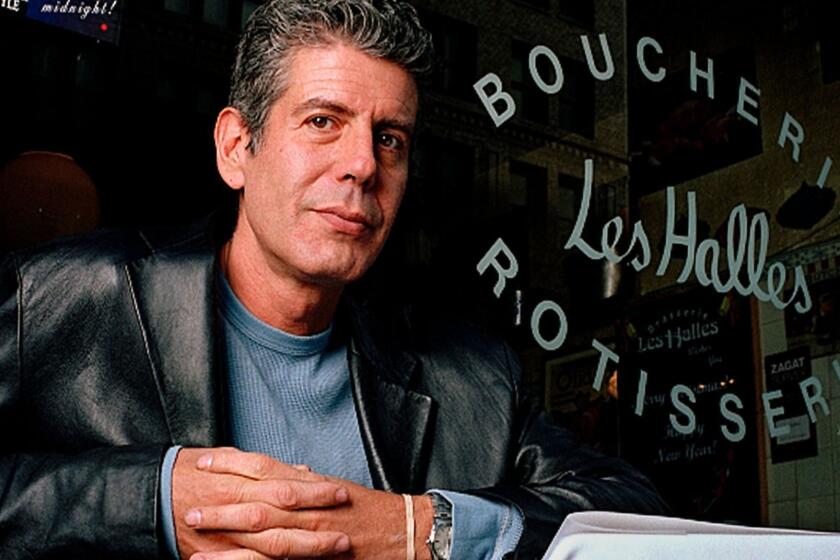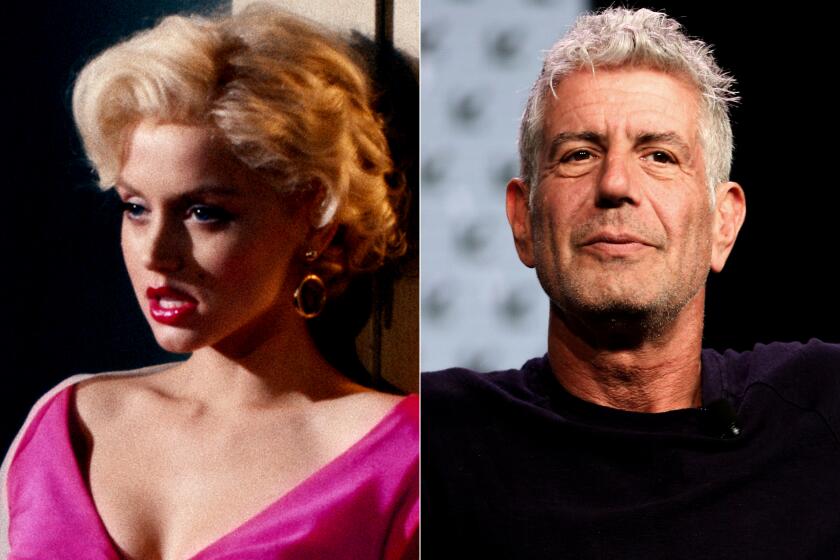What’s so controversial about the new Anthony Bourdain book? Plenty, it turns out
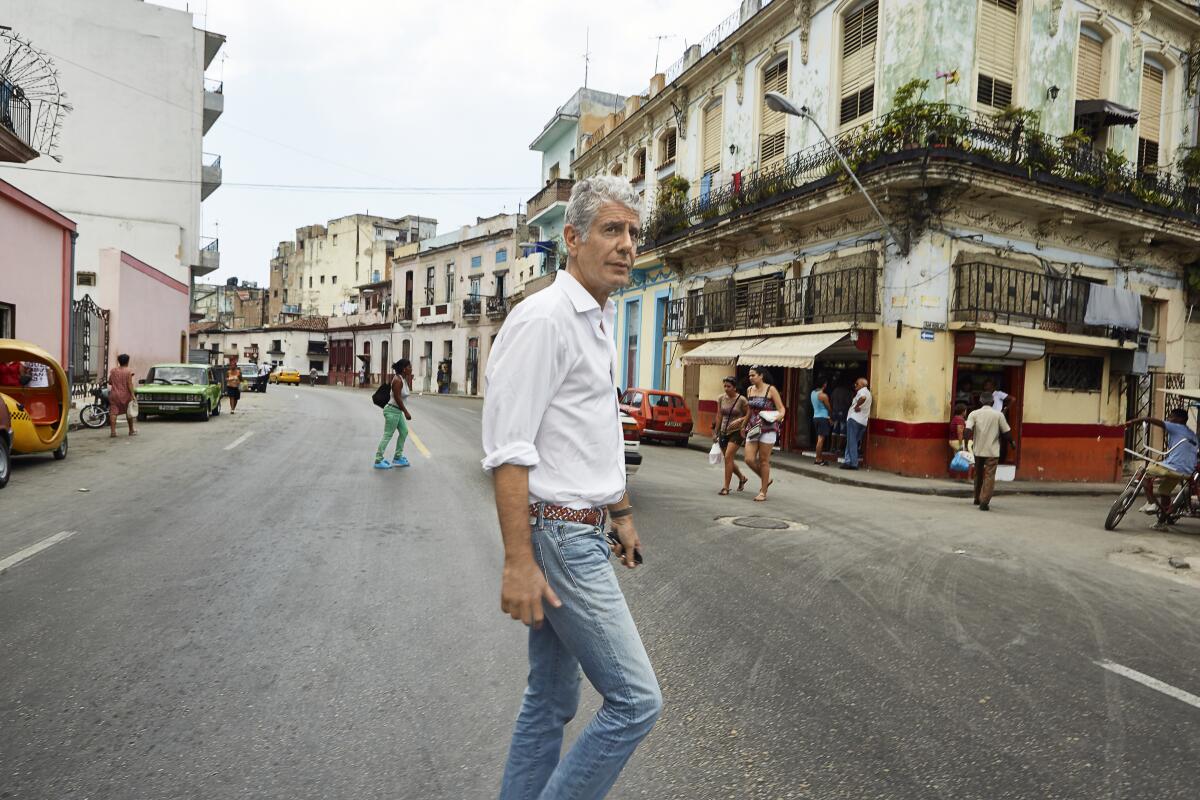
- Share via
A new biography about the late chef and TV personality Anthony Bourdain, who took his own life while filming CNN’s “Parts Unknown” in 2018, has been raising hackles well in advance of its Oct. 11 publication date — especially among those who knew Bourdain best.
The Times dipped into “Down and Out in Paradise: The Life of Anthony Bourdain,” by Charles Leerhsen, to break down what’s making some relatives and friends of the Emmy winner cringe.
Bourdain’s brother, Christopher, has called the book “hurtful and defamatory fiction.” However, in an email sent last week to The Times, Leerhsen said other Bourdain family and friends with advance copies “have confirmed that my take on the Bourdain family dynamic is accurate.”
But first, a word of warning: Leerhsen relies on many confidential sources and quotes some people, including Bourdain’s girlfriend, Asia Argento, and separated wife, Ottavia, who won’t confirm they spoke to him on the record. It also seeks concrete explanations for suicide, which, as Times columnist Mary McNamara wrote recently, makes it a “whodunit in which the answer” — addiction and mental illness — “is obvious.”
Here’s why “Down and Out in Paradise” is making waves.
‘Down and Out in Paradise’ by Charles Leerhsen features revelatory text messages between late chef Anthony Bourdain, his estranged wife and actor Asia Argento.
Blame for Bourdain’s suicide
Leerhsen repeatedly suggests that messages from Argento, Bourdain’s girlfriend at the time of his death, triggered his decision to kill himself. Leerhsen writes, “Not being able to end that relationship [with Argento] may have cost him his life.” Other people are also brought into the blame game. Leerhsen writes that the qualities that Bourdain’s former boss, the late Formerly Joe’s owner Andy Menschel, “brought out in [him] … I believe, figured very strongly in his final decision in that hotel room.”
Texts with Argento
Argento declined to speak on the record with Leerhsen, but that did not keep the author from quoting her. His book shares an excerpt from an email she sent him in which she cited Oscar Wilde (“It is always Judas who writes the biography”). She’s listed in the “Down and Out” acknowledgments as one of the people Leerhsen spoke with “and did not mind being named,” though the actor recently told the New York Times that she “wrote clearly to this man that he could not publish anything I said to him.”
Leerhsen also includes private text messages and emails exchanged between her and Bourdain from a “confidential source.”
Here are some of the alleged conversations:
According to Leerhsen, Argento asked Bourdain in 2016 for “a good reason not to do Charlie [her nickname for cocaine],” not long after they met for the first time in May of that year on the “Parts Unknown” set. Bourdain allegedly responded, “Because you will feel really horrible and neurotic … Also because I love you and it makes me frantic with worry and concern when you harm yourself or are unhappy.”
On June 8, 2018, the day of Bourdain’s suicide, after images of Argento and French journalist Hugo Clément in the lobby of Rome’s Hotel de Russie surfaced online:
Bourdain: “I am okay. I am not spiteful. I am not jealous that you have been with another man. I do not own you. You are free ... But you were careless. You were reckless with my heart ... I meant and mean everything I have ever said to you. But I hope you will have mercy on me for these feelings.”
Argento: “I can’t take this.”
Later that day, Bourdain asked: “Is there anything I can do?” Argento replied, “Stop busting my balls.” “Okay,” Bourdain responded. According to Leerhsen, Argento continued texting about wanting to break up, apparently unaware Bourdain had already hanged himself.
Seemingly reacting to the biography, Argento posted a picture to Instagram last week. The photo showed Argento wearing a T-shirt that featured former professional bodybuilder Ronnie Coleman with the phrase “Stop busting my balls” written over it.
Representatives for Argento did not immediately respond to The Times’ request for comment.
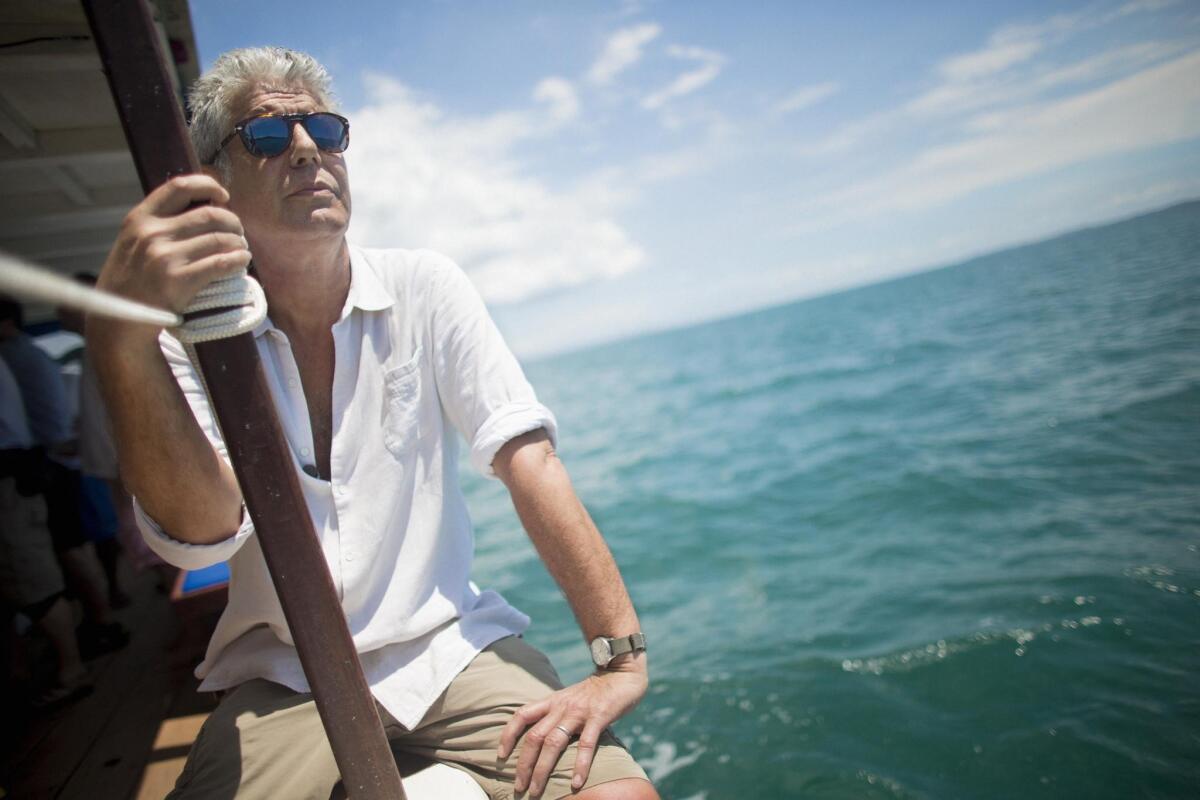
Bourdain’s support for Argento during #MeToo scandal
Bourdain allegedly offered to pay for Argento’s personal trainer, “told her to hire a nanny and that he would take care of all childcare expenses.” The book claims he also tried to find her a ghostwriter to support her “activist career” following her sexual assault accusations against Harvey Weinstein during the peak of the #MeToo movement.
In November 2017, Argento learned she was being sued by Jimmy Bennett, who claimed the Italian actor sexually assaulted him when he was underage. According to a confidential source cited in the book, Bourdain later paid her legal fees, hired a private investigator “to blackmail [Bennett] or sully his reputation” and gave Bennett $380,000 “in exchange for his promise not to pursue further legal action.”
I ate Anthony Bourdain’s food before I ever met him.
Bourdain allegedly pressured a colleague to speak against Mario Batali
Leerhsen claims Bourdain pressured his assistant Laurie Woolever, who had once worked for Batali, to share her own inappropriate stories about the chef. This was in the wake of allegations of sexual harassment and abuse that were made against Batali, an old friend and TV guest of Bourdain’s.
When she hesitated (and ultimately declined to speak about Batali), Bourdain allegedly texted, “No comment ain’t gonna work. You will need something ready, specifically saying if you saw anything untoward. We have seen this with Weinstein and the people who worked with him. If you are fast and firm and decisive you will be fine.”
Bourdain leaked information about Batali to the media, the biography also claims.
We say we understand that mental illness is real, but when people with histories of depression, addiction or alcoholism die via suicide we wonder how it could happen.
Private conversations with separated wife
Leerhsen also shared Ottavia Bourdain quotes “from a confidential source.” These include an exchange in advance of the birth of their daughter, Ariane. When she became pregnant before they married, Ottavia allegedly asked if Bourdain wanted to discuss a “plan B.”
When allegations against Weinstein surfaced, Leerhsen writes, Ottavia told a friend Bourdain “seemed paranoid all the time” and started seeing a therapist in the spring of 2018. “He was afraid he would have drunk himself to death otherwise,” she allegedly told the friend.
Ottavia is also quoted about Bourdain’s alleged steroid use. When Bourdain was photographed looking particularly muscular, rumors swirled that he was using steroids. Ottavia allegedly told a friend that Bourdain asked her to deny the rumors under a false name. “If someone said anything negative about him ... it was the end of the world,” Ottavia allegedly told the friend. Leerhsen claims the rumors were true and Bourdain did use steroids.
Ottavia is not listed in the book’s acknowledgments among the 103 people who spoke with Leerhsen on the record. But Bourdain’s estate, which she controls, “has not objected” to the biography, according to the New York Times. (The estate includes files and messages pulled from Bourdain’s phone and laptop.)
Morgan Neville’s anguished new documentary tackles the extraordinary life and tragic death of a beloved chef, writer and TV personality.
Bourdain’s relationship with prostitutes
Again based on “confidential sources,” Leerhsen reports that Bourdain continued to solicit prostitutes up to the time of his death, and that the last website he visited before he died by suicide, “after a few more Asia Argento googles, was a prostitution service.”
Bourdain’s continuous drug use
Leerhsen details Bourdain’s drug use from childhood to throughout his professional career, including just weeks before his death, when he allegedly ingested the hallucinogenic peyote plant between takes of “Parts Unknown” and discussed his interest in an acid trip. Bourdain had written extensively of his heroin and cocaine usage earlier in his career as a chef, but he allegedly continued to drink, sometimes heavily.
The complicated life of the late chef and travel documentarian is reexamined in Morgan Neville’s upcoming ‘Roadrunner: A Film About Anthony Bourdain.’
Bourdain’s tension with his daughter
By the time Bourdain’s daughter, Ariane, was 9, he was increasingly absent. When he did come home, a source claims he’d go to great lengths to act like he wasn’t in his wife’s company. (According to Leerhsen, Argento bristled at him seeing Ottavia, despite their open relationship.)
Ottavia allegedly told a friend that Bourdain would ask her to have dinner ready when he came home since he didn’t have much time to be with his family. But later, he’d post Instagram Stories of himself alone at a bar, “for Asia’s sake.”
“But the problem was that Ariane had Instagram. She was seeing it, too,” Ottavia supposedly said to a friend. “And it confused her and broke her heart.”
More to Read
Sign up for our Book Club newsletter
Get the latest news, events and more from the Los Angeles Times Book Club, and help us get L.A. reading and talking.
You may occasionally receive promotional content from the Los Angeles Times.
